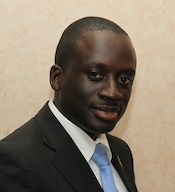 Edward Tenywa
Edward Tenywa
Head of Corporate Affairs
Communications Department
Bank of Uganda
Public Policy Program (’12)
Please tell us about your career path so far. What is your area of specialization and how did you come to work in this area?
I think my childhood in rural Eastern Uganda, which was by no means a privileged one, ingrained the need to serve the public good and pursue societal transformation. All my working experiences before, during and after university are related to one thing – public duty. My ten-year stint in the central bank is divided between being in the “kitchen” serving economic models and statistics in the Research Department and now, being at the frontline – communicating. Joining the Bank of Uganda in May 2004, a year after graduating from Makerere University with a Bachelor of Science in Quantitative Economics Degree was as competitive as it gets. It involved a written exam with about 800 other shortlisted candidates and an oral interview thereafter with another 100 or so contenders for the twenty available slots. That is the story of finding employment in sub-Saharan Africa. I thus committed to practicing economics to provide those public goods and services that can support employment creation. I believe in no place other than the central bank to be at the centre of creating that enabling environment for economic growth and employment creation. With regard to the transition from the Research Department to Communications, it is again about the passion to serve the public and help them understand what the central bank is doing to support their development aspirations.
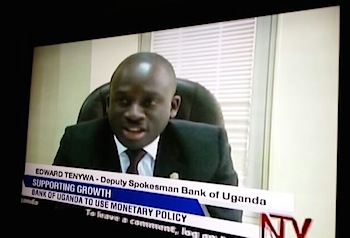
Edward explaining the Bank of Uganda’s policies at NTV
In 2011 when the Bank of Uganda was moving towards the implementation of an Inflation Targeting (IT) policy regime, there was an urgent need to strengthen the knowledge base and technical competence of the Communications Department through identification and retention of staff that understand and appreciate the important role communication plays in an IT monetary policy framework. I was thus transferred to spearhead policy communication as the Head of the Economist Section in March 2011. Following my return from GRIPS, I was appointed and later confirmed as an Assistant Director after a thorough interview process by the Bank’s Board of Directors in 2013. Beyond central banking, I am involved in other causes like national statistics development, several social-cultural development initiatives like housing cooperatives, advisory work for some cultural, religious and youth enterprises and some bit of philanthropy whenever possible.
As Head of Corporate Affairs in the Communications Department of the Bank of Uganda, what are your main responsibilities and duties?
In one sentence, my job is to speak for and on behalf of the central bank in order for every stakeholder to fully appreciate what the Bank of Uganda does, why and how it implements policies and how these policies benefit the stakeholder. My primary responsibilities of policy communication can be summed up by the words of Ben Bernanke, “the more guidance a central bank can provide the public about how policy is likely to evolve, the greater the chance that market participants will make appropriate inferences.”
My tasks include communicating and explaining monetary policy decisions and other economic and financial aspects to the different stakeholders of the central bank, including the media and the general public. In addition to spearheading the public education and awareness activities of the Bank of Uganda, my scope includes preparing and/or editing the Monetary Policy Statement, other economic and financial publications of the Bank, newsletters, booklets and senior management speeches addressing topical and strategic subjects of the day. I am responsible for the central bank’s media relations, corporate social responsibility, protocol, events and guest relations. The above responsibilities inherently entail attending to various meetings of the Bank including the Monetary Policy Committee (MPC) that sets the policy interest rate – the Central Bank Rate (CBR).
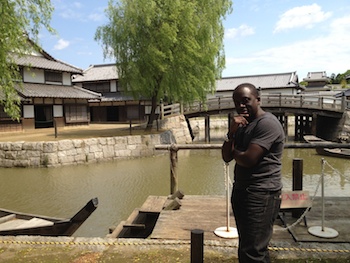
Edward appreciating the beauty of Japan during one of the field trips.
Some of Uganda’s statistics bring to life the challenges in central bank communication. First is the literacy level of about 70 percent in a multi-lingual environment, and second, a gini-coefficient of over 40. Imagine explaining to a poor and illiterate person, how printing more money than is required might not alleviate her poverty but rather exacerbate it. Think of a scenario where you have to convince millions of people, that increasing interest rates to fight inflation in a country where lending rates average 20 percent per annum is in their best long-term interest. How about if you tried translating the technical economic jargon into your local dialect without altering the technical meaning? That is a hint of the challenges but the job is self- satisfying. Apart from the attainment of low and stable inflation, the most rewarding is when an “ordinary” citizen comes over to say “thank you for a good job”.
During your career at the Bank of Uganda, what achievement(s) are you most proud of?
Achievement is a team sport. I am adding my cents to a collective effort in the transformation of the central bank and the economy in general. Recent surveys, opinions and empirical research provide substantial evidence that the Bank of Uganda is becoming more transparent, approachable by both the media and the public and this improved communication has played a critical role in the achievement of the central bank’s mission – fostering price stability and a sound financial system. I am proud to be part of a team that is spearheading an independent central bank that is also transparent and accountable to its people.
What is the most important thing you got out of your studies here, and how has your experience at GRIPS prepared you for future endeavours?
The most important thing for me is the social capital from the multi-cultural dispensation at GRIPS. I continue to draw inspiration, lessons and development initiatives from the exchanges with my fellow students and network of friends I created while in Japan. I believe these personal and professional networks shall be vital in advancing mutually beneficial relationships between countries within the global economy.
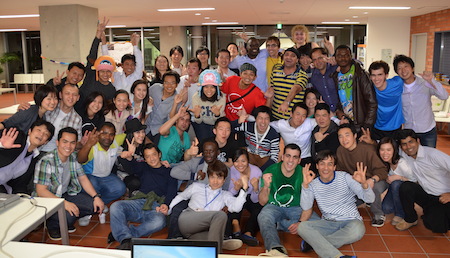
One of the many opportunities to make friends and network with fellow students from all over the world.
What I miss most about Japan is its modest and respectful people and of course its efficient infrastructure. An Italian poet by the name of Cesare Pavese is quoted saying “We do not remember days, we remember moments”. Memories of laughter filled sessions with fellow students and both the academic and non-academic staff are abound. Talk of knowledge sharing sessions on both cultural and academic merits, the various trips across Japan, parties, the flavored Asian cuisine, the Roppongi “happy-hour” (sorry Prof. Rhodes..), karaoke sessions and the tension as students awaited the release of the term results. I am not sure if I miss the nearly weekly tests and exams but each day was worth living.
How do you maintain a balance between your work and the rest of your life?
A researcher that can find a global equilibrium point for work and family or leisure must be a contender for the Nobel Prize in economics. And most definitely, I am not a contender! However, I optimize any available free time for family and friends via sports, music, dining at quiet places and travel to explore the lands far away from my birthplace.
If you could give one piece of advice to anyone considering studying at GRIPS what would it be?
GRIPS is probably the only place on earth that I know of where the staff are at the full-time service of the students. So my advice to prospective students would be to “maximize the time at GRIPS and create your own social and professional network that shall help you become a truly global citizen”.
How would you like to maintain involved with the School? What do you expect from GRIPS as an alumnus?
The Alumni association is such a potent tool for keeping each one of us involved no matter the distance from Roppongi. We can leverage technology to provide cost-effective support to the alumni & the school. I think of things like virtual alumni forum days where alumni of a particular program or year can be engaged in an hourly exchange on a topical issue or simply keeping tabs with each other and the current students. I would welcome access to the GRIPS Forum presentations via live online streaming with exclusive access for alumni.
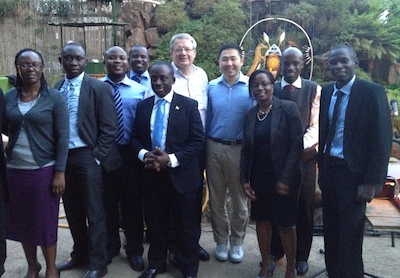
A GRIPS alumni reunion when Prof. Rhodes visited Uganda in 2013.
The enduring legacy of an institution or person lies in the fruits of her investment. The Alumni network can be leveraged to impact its members and the communities from which GRIPS alumni come from through creating an investment arm or foundation. The financial resources can be by way of individual or corporate subscription for interested Alumni. The pool of resources can go towards funding research projects or even subsidizing the cost of training at GRIPS for staff of the affiliated corporate entities or Alumni that require further studies of any form at GRIPS. The Investment Arm can also invest the pooled resources to generate income for its members. The starting point for this kind of experiment would be the local alumni groups.





